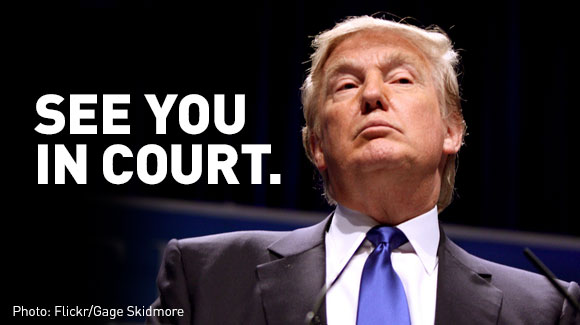
The US Court of Appeals for the Ninth Circuit unanimously (3-0) refused to reinstate President Trump’s Executive order on Muslim ban, put in place by Judge James Robart, federal judge in Seattle. The Ninth Circuit found that the two states, State of Washington and State of Minnesota, through their universities have a standing to sue. They established that their students, faculties and therefore their State Universities have suffered and will continue to suffer with this ban in place. The Court struck down the Government argument that the Government’s actions related to immigration and security are unreviewable. The Court said that it recognizes that the Government has a power in this area but the Court has a right to review any contravening constitutional principles and rights.
The Court further rejected the Government’s separation of power argument saying that “Although our jurisprudence has long counseled deference to the political branches on matters of immigration and national security, neither the Supreme Court nor our Court has ever held that courts lack the authority to review executive action in those arenas for compliance with the Constitution. To the contrary, the Supreme Court has repeatedly and explicitly rejected the notion that the political branches have unreviewable authority over immigration or are not subject to the Constitution when policy making in that context“, quoting Zadvydas v. Davis, 533 U.S. 678, 695 (2001) (emphasizing that the power of the political branches over immigration “is subject to important constitutional limitations”); Chadha, 462 U.S. at 940-41 (rejecting the argument that Congress has “unreviewable authority over the regulation of aliens,” and affirming that courts can review “whether Congress has chosen a constitutionally permissible means of implementing that power”).
The Court has likewise made clear that “[a]lthough alienage classifications are closely connected to matters of foreign policy and national security,” Courts “can and do review foreign policy arguments that are offered to justify legislative or executive action when constitutional rights are at stake.”
The Ninth Circuit Court states that while counseling deference to the national security determinations of the political branches, the Supreme Court states that the Government’s “authority and expertise in [such] matters do not automatically trump the Court’s own obligation to secure the protection that the Constitution grants to individuals,” even in times of war.
The Ninth Circuit’s decision is guided by four questions: “(1) whether the stay applicant has made a strong showing that he is likely to succeed on the merits; (2) whether the applicant will be irreparably injured absent a stay; (3) whether issuance of the stay will substantially injure the other parties interested in the proceeding; and (4) where the public interest lies.”
The Court found that the Government did not satisfy the burden of first two prongs.
The Court could not find that the Government protected the States due process rights. In fact the Court states “The Government has not shown that the Executive Order provides what due process requires, such as notice and a hearing prior to restricting an individual’s ability to travel. Indeed, the Government does not contend that the Executive Order provides for such process. Rather, in addition to the arguments addressed in other parts of this opinion, the Government argues that most or all of the individuals affected by the Executive Order have no rights under the Due Process Clause.” The Court thus confirmed that the States have a due process rights too.
What came back to bite President Trump are his previous statements about Muslims. The States maintain that the Executive Order violated the establishment and equal opportunity clauses as it disfavors the Muslims. The Court concludes by saying that “The States claims raise serious allegations and present significant constitutional questions. In light of the sensitive interests involved, the pace of the current emergency proceedings, and our conclusion that the Government has not met its burden of showing likelihood of success on appeal on its arguments with respect to the due process claim, we reserve consideration of these claims until the merits of this appeal have been fully briefed“. And considering the balance between hardship and public interest, declined to stay the District Court’s TRO.
So at this time, the ban is lifted as the District Court’s Temporary Restraining Order allows the nationals of the seven countries to enter the country, while the case on the merits is pending.
We are practicing Immigration Law at a time where immigration is part of our country’s focus. And we are witnessing the writing of Immigration history – to observe, comment and support the cause of immigrants.





Be the first to comment